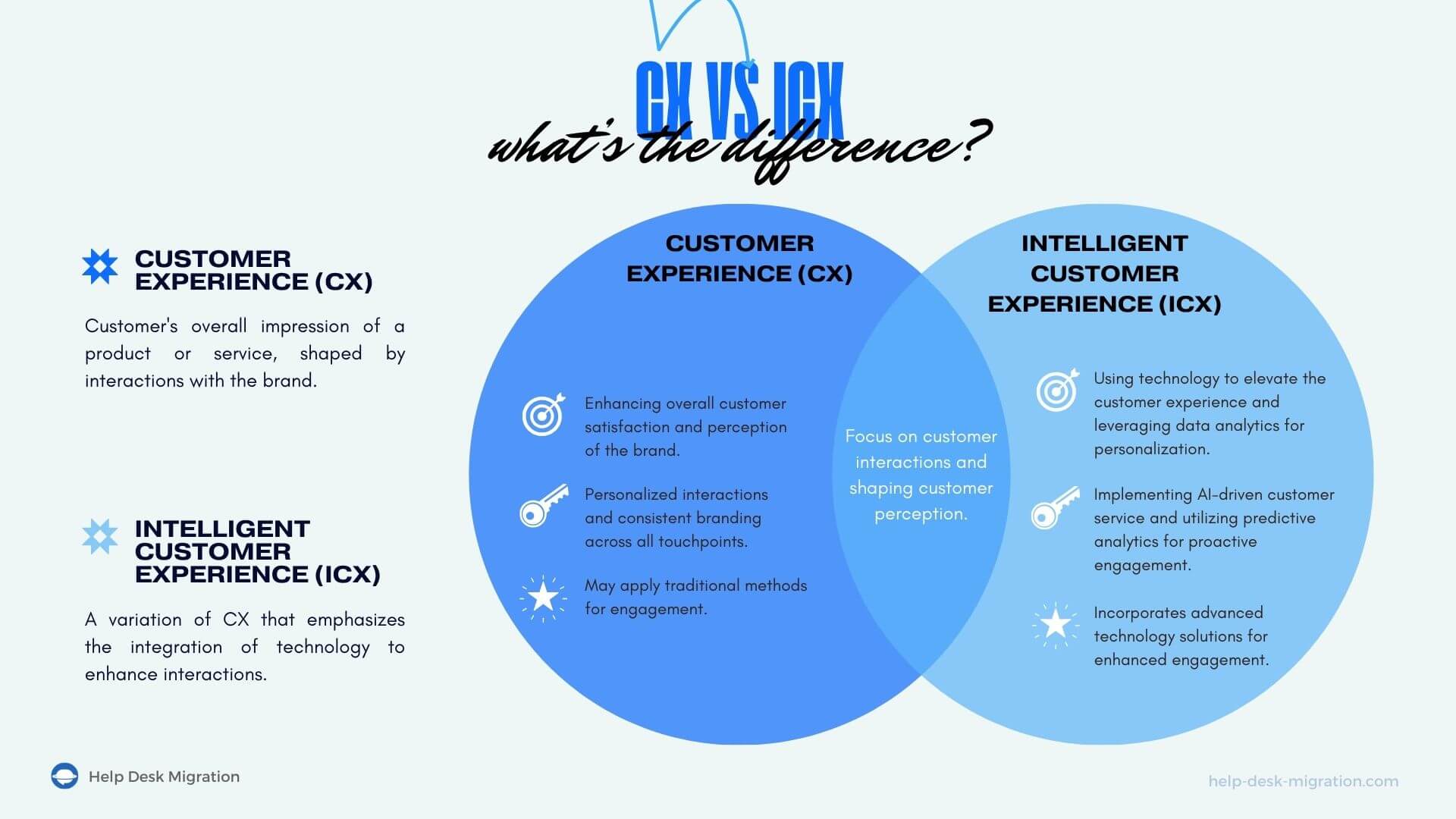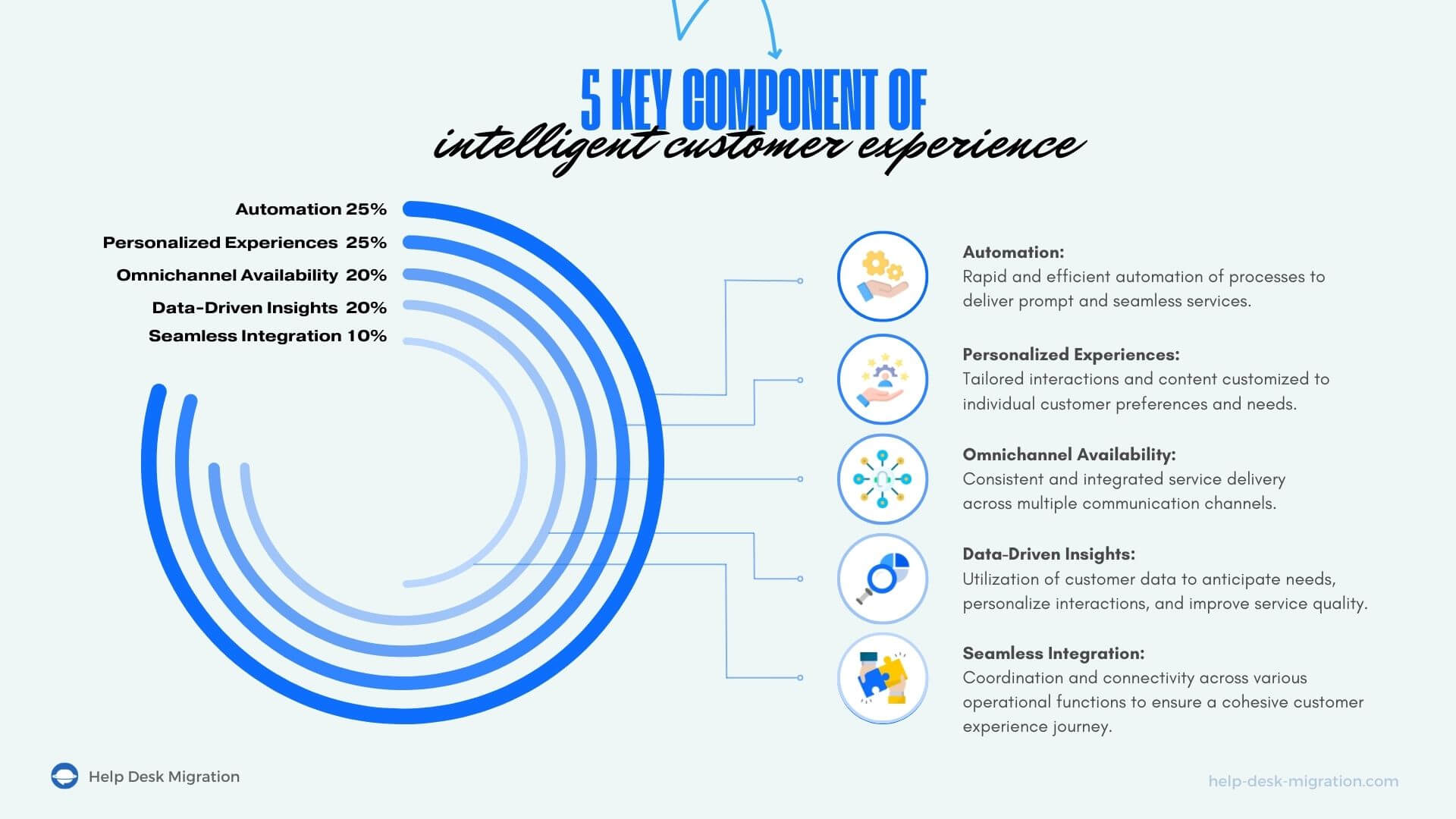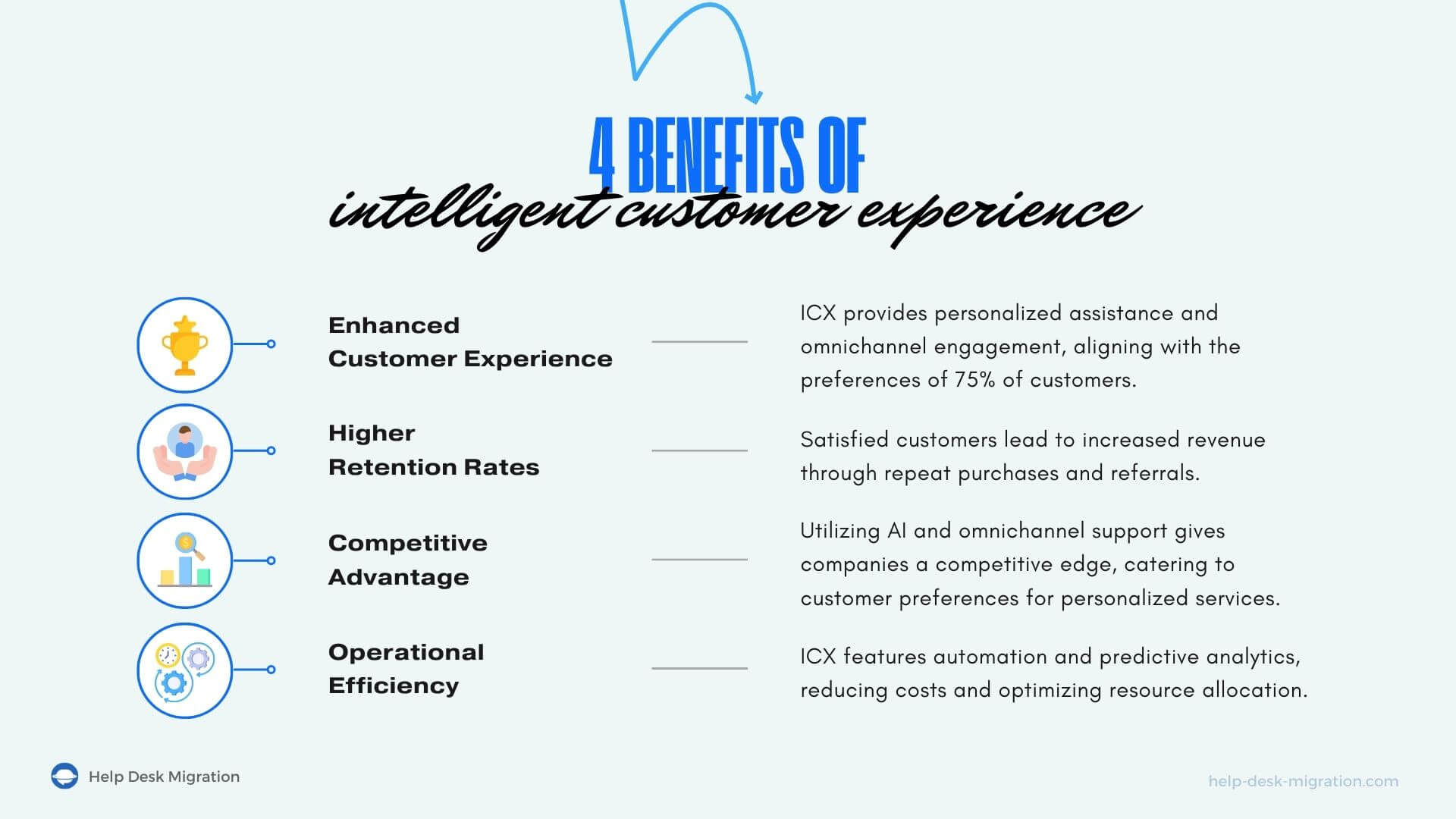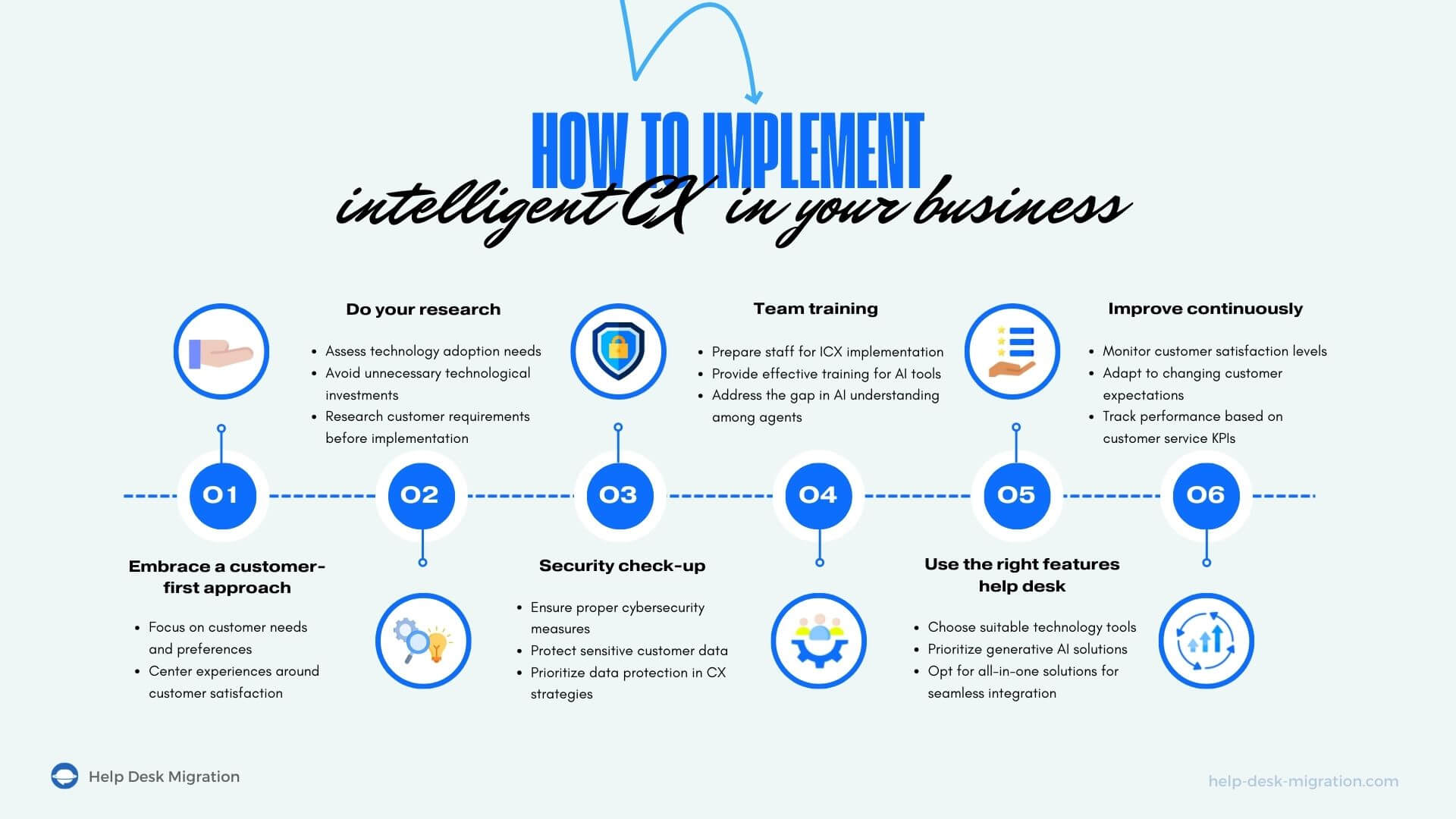Intelligent customer experience involves harnessing data and technology to create personalized, proactive, and seamless interactions across all customer touchpoints. It goes beyond traditional customer service by anticipating customer needs, resolving issues proactively, and delivering tailored experiences that delight customers.
The product is indeed the king. But customer experience is like the hidden power that keeps everything running smoothly. Ignore it, and even the best product can lose its shine and fall from grace.
Metaphors aside, research by Quatrics indicates that 35% of consumers reduce spending with a company following a poor customer experience, and another 15% abandon the business altogether. Modern customers aren't merely becoming more demanding; they seek quick, personalized, understandable, and omnichannel customer care, as another study reveals.
Fortunately, intelligent customer experience enables businesses to meet all these expectations without much effort. Let us explain why.
TL;DR
- ICX is more than just a buzzword; it's a strategic approach to customer experience management that prioritizes prompt service, proactive engagement, and personalized interactions across all touchpoints.
- Unlike traditional customer service, ICX anticipates customer needs, resolves issues proactively, and delivers tailored experiences that not only meet but exceed expectations.
- While customer experience (CX) encompasses a broad spectrum of interactions between a customer and a brand, ICX represents a specialized approach that integrates technology to enhance every facet of the customer journey. This emphasis on leveraging technology sets ICX apart, enabling businesses to deliver seamless, personalized experiences at scale.
- Key Components of Intelligent Customer Experience
- Central to ICX is the use of automation to provide prompt and efficient service around the clock. From automated workflows to advanced chatbots, automation streamlines interactions, ensuring quick responses and consistent service quality.
- ICX extends across all communication channels, offering customers a seamless experience as they transition between platforms. Whether it's starting a chat on a website and seamlessly switching to a phone call, omnichannel availability ensures continuity and convenience.
- Tailoring experiences to individual preferences is a cornerstone of ICX. Whether through dynamic app interfaces, targeted email campaigns, or AI-powered chatbots, personalization enhances engagement and fosters customer loyalty.
- Data serves as the foundation of ICX, enabling businesses to anticipate customer needs, resolve issues proactively, and refine their overall customer experience. Predictive analytics and comprehensive data integration empower organizations to make informed decisions and continuously improve.
- ICX relies on seamless integration across all business operations, breaking down data silos to create a holistic view of the customer journey. This interoperability facilitates swift resolution of customer issues and enhances operational efficiency.
- Benefits of Implementing ICX
- ICX significantly enhances customer satisfaction by providing prompt, personalized, and omnichannel support, aligning with modern expectations for exceptional service.
By delivering enhanced experiences, ICX fosters customer loyalty and retention, ultimately driving higher revenue and profitability. - Embracing ICX gives businesses a competitive edge, positioning them as leaders in customer service excellence and technological innovation.
- Automation and data-driven insights inherent to ICX improve operational efficiency, reducing costs and optimizing resource allocation.
- Embracing ICX requires a strategic shift in mindset and a commitment to customer-centricity. It involves conducting thorough research, ensuring data security, providing comprehensive training, and selecting the right tools and technologies to support your ICX strategy. Continuous improvement is key, as customer expectations evolve, and businesses must adapt accordingly to stay ahead of the curve.
- Intelligent customer experience isn't just a concept for the future—it's a reality that businesses must embrace to thrive in today's competitive landscape. By prioritizing ICX, organizations can elevate their customer experience to unprecedented levels, driving growth and success in the digital age.
What Is Intelligent Customer Experience?
Intelligent customer experience (ICX) is a customer experience management method that heavily relies on using data, artificial intelligence, and automation.
The goal of ICX is to offer prompt service, proactive customer engagement, and personalized experiences across all touchpoints, catering to present-day customer requirements.
Intelligent Customer Experience vs Customer Experience: What Is the Difference?
We hear you are asking us: Are you sure there is a difference between intelligent customer experience (ICX) and customer experience (CX)? Well, ICX is a variation of CX, and here’s why.
Customer experience is a multifaceted concept that can be considered from two equally valid angles:
- From the customer’s viewpoint, CX is a customer’s impression of your product or service shaped by every interaction with your brand.
- From your business’ standpoint, CX is how your business engages with its customers across all touchpoints.
These perspectives are interconnected: how a business interacts with its customers directly impacts their perception of the brand. To cultivate a positive impression, businesses employ various strategies, one of which is intelligent customer experience.

ICX emphasizes using technology to take every customer interaction to the next level. This approach sets it apart from other CX methodologies that may or may not incorporate technological solutions.
5 key components of intelligent customer experience
"The use of technology" can mean different things in different contexts. Today, most businesses heavily rely on technological solutions. What kind of tech do we talk about when we talk about ICX?
These are the key components of intelligent customer experience, according to CX leaders.

Automation
Promptness is a core feature of intelligent CX, and automation is what allows businesses to provide prompt services around the clock.
Automation involves not just automated workflows, such as skill-based ticket routing and smart support agents scheduling, but also using generative AI solutions, or evolved chatbots.
Available 24/7, these tireless assistants can understand customers’ intents and respond to customer support queries quickly, matching your brand’s tone of voice. No wonder, 70% of business leaders plan to integrate such assistants across touchpoints in the next few years, as Zendesk’s CX trends 2024 report shows.
Omnichannel availability
Companies plan to integrate generative AI into every touchpoint, including phone. This aligns with another key feature of intelligent CX—omnichannel availability.
Omnichannel ICX guarantees consistent service quality across all communication channels. It also allows seamless transitions in conversations, so customers can move between channels easily. For instance, a customer starts a chat on your website and then smoothly switch to phone call without telling their request once again.
Achieving this level of service integration is much easier than one might expect. Leading help desk solutions enable support teams to centralize and manage all customer conversations from a single platform.
Personalized experiences
Good customer service offers personalization by default. So no wonder, it is a must-have element of intelligent CX.
Personalization in CX can take different shapes. It can be
- an app that dynamically adapts its interface based on usage patterns.
- an email with product recommendations based on the customer's preferences, purchase history, and browsing behavior.
- an AI-powered chatbot in a banking app, giving customers tailored finance advice based on the user's transaction history, spending patterns, and savings goals.
Your task is not to stuff your customer journey with all kinds of personalized experiences. First, you should understand what your users need.
Data-driven insights
Can you find leaders who are not obsessed with data? Well, we are doubt such CEOs and C-level managers can be found.
Beyond personalization, data helps provide prompt and high-quality customer service—another crucial element of intelligent CX. With all the necessary information about the customer (personal details, past purchases, behavior patterns, and past interaction history with the support team) at hand, your support rep will be able to promptly address this customer’s request without asking the same questions over and over again.
In the context of intelligent CX, data collection not only results in faster request resolution, but also prevents these requests in the first place. All credit goes to predictive analytics, which helps forecast customer behavior, identify trends, and anticipate needs or concerns before customers express them.
On top of that, data-driven insights help businesses identify areas for improvement, drawing on customer feedback and other information, and refine the overall customer experience.
Seamless integration
To gain a comprehensive understanding of your customer profile, you need to connect customer data across all your business operations. This is why many companies prioritize breaking down data siloes to align their support service, marketing, sales, logistics, and operations teams.
For example, when a customer reaches out to customer service about a defective product, a representative can quickly check their purchase history and service records if all the data is gathered in one place. Then, they can swiftly coordinate with the delivery department to replace the product without delay.
To achieve this level of interoperability, companies leverage tools that seamlessly integrate with each other.
4 Benefits of implementing intelligent customer experience
Zendesk's report suggests that ICX is not a concept of tomorrow; it’s already here. In fact, as many as 70% of CX leaders are reevaluating their entire customer journey to align with intelligent CX principles.
Their decision is driven by the following reasons.

1 Improved customer experience
Intelligent customer experience isn't just a fancy perk for businesses trying to stand out from the competition. 75% of customers report that their favorite brands have responded promptly and provided personalized assistance to their most recent queries—exactly what you expect from ICX. Omnichannel engagement is another top priority, as 62% of customers seek to interact with brands across multiple digital channels.
Finally, 51% of respondents prefer advanced chatbots, a defining feature of ICX, for immediate response.
As the figures suggest, intelligent CX significantly improves customer experience.
2 Higher retention rates
High customer retention translates to significantly higher revenue. In customer service, a mere 5% increase in customer retention could yield a remarkable 25% increase in revenue—a calculation made by Bain & Company over 20 years ago.
Meanwhile, an enhanced customer experience, which ICX can deliver, is a crucial factor in customer loyalty and retention. Research shows that customers happy with their recent experiences are four times more likely to buy again and eight times more likely to recommend a brand compared to those with negative experiences.
3 Competitive advantage
The rapid evolution and widespread adoption of technology have created a glaring divide between companies that embrace these advancements and those that do not. For 65% of UK customers, AI is already an integral part of modern customer service.
What does this mean in practical terms? Consider two companies offering equally great products or SaaS services. One company provides highly personalized offerings and 24/7 omnichannel support, while the other offers only email-based customer service with Monday-to-Friday availability. It’s pretty obvious which company will become customers’ favorite.
4 Operational efficiency
Intelligent CX relies heavily on automation, so one of its positive ‘side effects’ is improved operational efficiency. For instance, Gartner estimates that by 2026, conversational AI deployments in contact centers will reduce agent labor costs by a whopping $80 billion.
At the same time, automation is not the only factor that amps up efficiency. Another ingredient of ICX, predictive analytics, helps proactively allocate resources, adjust inventory levels, and optimize workforce schedules to meet demand. Centralized data management allows businesses to have a holistic view of the customer journey and make data-driven decisions faster.
Intelligent CX holds the potential to elevate customers' perception of your brand to unprecedented heights. However, to enjoy the full benefits of ICX, you must implement it correctly.
How to implement intelligent CX in your business
Transforming your CX into ICX takes more than just switching from one customer service platform to another. It’s all about embracing a new mindset on the organization’s level.
Let’s see what it involves.

Step 1: Embrace a customer-first approach
ICX rests on a customer-first approach. For a modern business to survive, simply focusing on products and services is not enough. It’s critical to put the customer at the forefront and center experiences around their needs.
Step 2: Do your research
Adopting technology just for the sake of it is pointless. Your customers might not need a generative AI in every digital touchpoint, or the scale of your operations might simply be too small for total automation.
Don’t rush to commit to a radical CX overhaul. Do your research first.
Step 3: Security check-up
Intelligent CX implies collecting and processing large volumes of customer data. This raises cybersecurity concerns. Before you initiate any data harvesting efforts, be sure to have proper security measures in place to protect sensitive information.
It comes as no surprise that a staggering 83% of customer service leaders prioritize data protection and cybersecurity in their customer service strategies.
Step 4: Team training
Implementing ICX methods can drastically change your internal workflows. Take your time to prepare your staff for the transition. Providing training is essential—as long as it’s truly effective.
There’s a notable disconnect when it comes to AI-related initiatives. Although 72% of businesses claim that their agents are well-trained in generative AI tools, only 34% of agents in these companies report having a comprehensive understanding of their department's AI strategy.
Step 5: Use the right-features help desk
Intelligent customer experience relies heavily on technology, so it’s critical to choose the right tools.
Generative AI solutions are pivotal in any ICX strategy. They’re often the drivers behind prompt, personalized, and omnichannel service. By investing in robust predictive analytics solutions, you can gather data-driven insights for proactive customer experiences. And don’t forget about agent management tools—they’re crucial for predicting your team’s needs and keeping service top-notch even during the busiest times.
To prevent data silos, it’s best to go for all-in-one solutions that include generative AI chatbots, analytics tools, and agent management capabilities. Prioritize solutions that can easily integrate with each other, like software suites, to keep operations running smoothly.
Step 6: Improve continuously
Implementing an intelligent customer experience strategy is an ongoing process. Customer expectations are always changing, and you must adjust accordingly. Even though 84% of managers believe they meet or even exceed customers' desires to feel heard and understood, only 45% of consumers agree with that.
Aside from monitoring customer satisfaction levels, it's crucial to keep track of how well your help desk is performing based on your customer service KPIs.
So do you need intelligent customer service?
Today, providing excellent service goes far beyond just answering customer calls politely. Customers expect businesses to understand their needs and be available 24/7 across their preferred channels, ready to address their requests promptly. Intelligent customer experience practices make this level of service possible.
Adopting ICX may be challenging, but many leading help desk solutions are actually ICX-friendly. These customer service tools offer omnichannel support, GenAI-powered chatbots, predictive analytics, and automated workflows. They seamlessly integrate with CRMs, SDR solutions, marketing automation tools, websites and more.
Choosing the right help desk, service desk or ITSM platform is a big step toward success. If you're considering such a solution and planning to make a data import, Help Desk Migration is here to assist and migrate your support service data automatedly. Set up a free Demo to see how easy and painless data migration can be!



